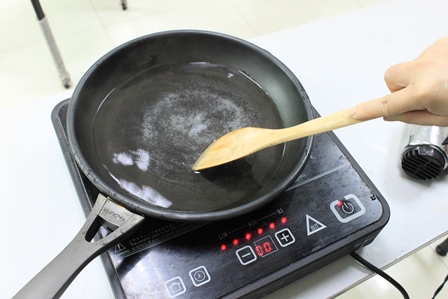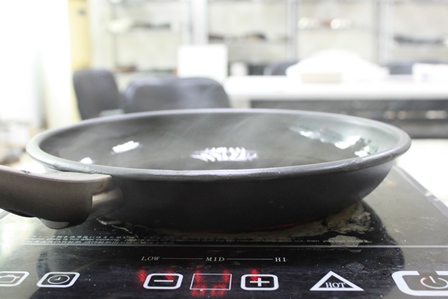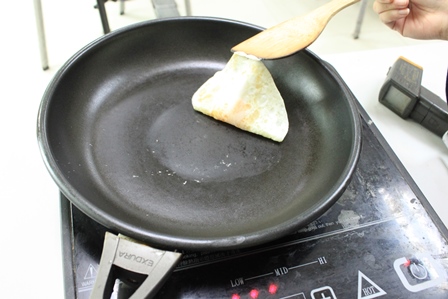As was noted previously here, Lotus Rock does not have a chemical non-stick release. Unlike most other famous non-stick coated pans, such as Calphalon, Scanpan and Tefal, which contain a chemical compound called PTFE for non-stick release, a Lotus Rock pan has instead a natural, durable non-stick release, which is PTFE-free.
When a general, PTFE non-stick coated pan loses its non-stick release, it cannot be renewed – it becomes obsolete. With no non-stick release a PTFE-coated pan will become harder to clean and the coating may start to peel off, making the pan unfit and hazardous for further use. However, if after some use, food begins to stick to a Lotus Rock pan and it becomes harder to clean then it can, just like with uncoated cast iron or steel, be “re-seasoned”, or to put it in a more appropiate way for a Lotus Rock pan, the non-stick release can be ‘renewed’.
If your Lotus Rock pan does become hard to clean, with a reduced non-stick effect, then the below steps can be followed to remedy this.*
*Please note, that in addition to the steps shown below, the consumer must still wipe some oil onto the surface of a Lotus Rock pan before each use.
Lotus Rock non-stick renewal procedure
First step – boil water
- Fill a Lotus Rock pan half full of water and heat until boiling.
- Continue boiling the water for around 10-15 minutes, until the residual substances inside the surface of the pan are released.
- Some gentle scrubbing may need to be done to help complete this process.
- Once finished, pour the water out of the pan, clean it and then dry.
Second step – heat oil
- Fill the pan with oil about 1cm deep and heat the oil until it starts to smoke.
- Then, carefully pour the oil out of the pan into a suitable container.
- Clean the pot dry, and then start to use the pan again for cooking.*
As is shown in the photos above, the Lotus Rock pan used in this test has a special feature included – the Stable Concave design. For more information about this please read here.
*Important! The pan must be washed after use. If too much cooking oil remains in the silicon-oxide crystal surface this will affect the non-stick release. Just like if oil is left around a jar it becomes sticky, which makes it uncomfortable to use




. At the end of this process it says “clean the pot dry” — does that mean wipe off all the oil until it’s dry? Or clean with a de-greasing soap and then dry it off. Thanks!
. Dear Nancy, thank you for your enquiry, you have asked a very pertinent question about the non-stick renewal process. The pan must be washed after this procedure is complete. If too much cooking oil remains in the silicon-oxide crystal surface this will effect the non-stick effect. Just like if oil is left around a jar it becomes sticky, which makes it uncomfortable to use. Likewise, if too much cooking oil is used to season a cast iron skilet then the pan’s surface will be sticky rather than non-stick.
. You didn’t really answer the question. Should the pan be cleaned with dish soap? Or is it like a cast iron skillet where soap should never be used?
. Dear Carlos, thanks for getting back to us. Yes, all Lotus Rock pans have a non-reactive surface and can be washed with soap.
. I recently performed a non-stick renewal on my frying pan, which is the same frying pan shown in the photos above. Foolishly, while boiling the water in the pan, I left the kitchen and became preoccupied. Some time later, I smelled burning. I rushed to the kitchen where I found all the water gone from the frying pan. A white residue was left behind. The burning smell was from the underside of the pan, where some of the finish was burnt away. As for the interior of the pan, when it cooled down and I cleaned it up, the lustre was gone from the central area of the pan and, in this central area, the texture was no longer as smooth as the rest of the pan. The next day, I fried some bacon in the pan and the pan appeared to perform as well as before. However, I am concerned that I may have damaged the pan in such a way that it is no longer safe for my health to continue using it. Your advice in this matter would be appreciated. Thank you!
. Dear Steven, thank you for your enquiry with us. As explained here, Lotus Rock pans do not have a chemical non-stick so over heating the pan will not produce a hazardous smoke like an over-heated PTFE pan might do so. Although pleaes always monitor your pan at all times, becuase an over-heated pan can still be hazardous in other ways.